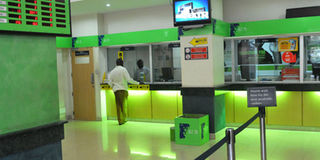Prime
Banks write off bad debts as defaulters increase

A man transacting business at a counter in a banking hall. Some commercial banks have recorded an increase in the amount of bad debts that have been written off. PHOTO by FAISWAL KASIRYE
What you need to know:
Impact. An increase in bad debts that have been written off is expected to shrink profitability for several banks.
Ugandan commercial banks stepped up efforts to clean up their books by writing off bad loans, highlighting the growing debt risks in the market.
The quality of loans in Uganda’s banking industry has been deteriorating for the past two years, following a rise in lending rates to more than 30 per cent as the Central Bank tightened the monetary policy stance to curb inflation which peaked to 30.4 per cent in October 2011.
The turbulent economic environment made it challenging for those who had taken loans to repay the loans as their income streams were negatively impacted by subdued demand and constrained growth in the market. As a result, many commercial banks are now being forced to write-off huge amounts of unpaid loans.
Debts written off
Kenya Commercial Bank (KCB), on the other hand, wrote off Shs3.2 million of debt that could not be collected, up from Shs2.1 million a year earlier while that Centenary Bank increased to Shs7.8 billion from Shs4.7 billion in 2012.
Others that posted an increase in the amount of bad debts that have been written off include Finance Trust Bank which wrote off Shs1 billion from Shs688 million, Post Bank that wrote off Shs1.5 billion, up from Shs863 million), and Crane Bank which wrote off Shs29.9 billion in bad debts, up from Shs26.8 million in 2012.
Equity bank wrote off Shs2.9 billion in bad debts, up from Shs1 billion the previous year while Housing Finance wrote off Shs7.7 billion in bad loans, up from Shs3.9 billion.
Cairo Bank wrote off Shs1.4 billion, up from Shs831 million in 2012.
However, banks such as Barclays and Baroda managed to lower the amount that was written off in bad debt.
Barclays’ bad debts that were written off reduced to Shs15.5 billion, down from Shs16.9 billion in 2012 while those of Baroda declined to Shs956.6 million from Shs2.7 billion.
The move to clean up banks’ balance sheets is another indication of the effects the debt build-up has on the economy.
Analysts and bank executives say banks have been under pressure due to the turbulent economic environment the country went through about three years ago.
Impact of bad debts
According to Mr Stephen Kaboyo,the Alpha Capital managing director, the large amount of bad debts that were written off not only erodes the industry’s profitability but also exerts pressure on banks’ net worth, which in turn lowers banks’ ability to take risks such as investing in business expansion.
“For many SMEs, it has been a rough ride; the economic environment has been extremely adverse and it impacted businesses negatively,” Mr Kaboyo notes.
Mr Michael Kaddu, the head of corporate affairs Barclays Bank, attributes the increase in the amount of written off debts to borrowing based on speculation rather than business plans and lack of financial discipline.
The credit boom that resulted from the race for customer numbers prior to the 2011 economic challenges saw commercial banks give out huge sums of money in loans, without critically analysing customers’ ability to repay.
This resulted into massive growth in loans and advances to customers on banks’ loan books, which have now gone bad as borrowers are unable to honour their loan obligations.
Ms Barbara Arimi, Orient Bank’s group head for corporate communications, says an increase in the amount of written off debts is expected to shrink profitability for several banks, thereby affecting the overall performance of the banking industry.
This is true, as witnessed in the poor financial performance several banks posted last year.
With exception of a few banks including Centenary, Equity, KCB, Dfcu, Diamond Trust, Cairo and Post Bank which managed to post profit increases, others either registered profit declines while others made losses.
Decline in profits
Those that registered a decline in profit include Stanbic, Standard Chartered, Crane, Housing Finance, Tropical Bank and ABC Capital, among others.
Those which posted losses include Bank of Africa, NC, Imperial Bank, Global Trust, Orient and Ecobank posted losses over the period.
The decision by banks to write off uncollectable loans, according to Stanbic Bank managing director Philip Odera, seeks to clean up banks’ loan books.
Effect of bad loans
According to Mr Kaddu, an increase in the amount of bad loans written off will decrease funds available for lending and deplete resources the industry would have used to make further investments.
The uncertainty in the market saw banks’ provisions for bad loans increase.
For instance, Equity Bank’s provision for bad and doubtful debts increased to Shs3.5 billion in 2013 from Shs2.6 billion the previous year while Housing Finance’s impairment losses on loans and advances increased to Shs11.4 billion from Shs5.8 billion.
Standard Chartered’s provisions for bad loans rose to Shs47.6 billion from Shs7 billion while that of ABC Capital went up to Shs1 billion from Shs136.6 million.
Mr Kenneth Kitariko, the African Alliance chief executive officer, says the banking industry’s asset quality has been through its worst.
Although they remain on banks’ balance sheets as banks attempt to collect the funds or sell them at a discount, they trim earnings. It is these provisions that banks later write off if they fail to collect both the principal and interest as scheduled in the loan agreement.
According to the Financial Institutions Act, 2005, a facility must be written off within 90 days of being downgraded to ‘loss’ category.




